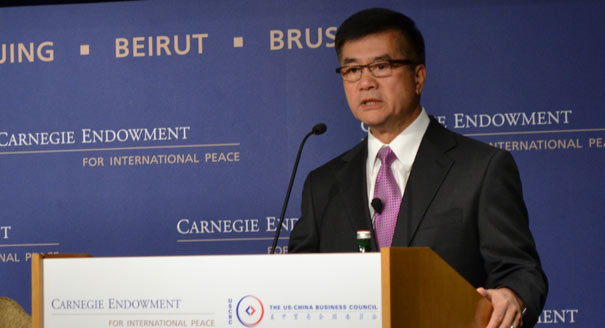{
"authors": [
"Douglas H. Paal",
"Gary Locke"
],
"type": "event",
"centerAffiliationAll": "dc",
"centers": [
"Carnegie Endowment for International Peace",
"Carnegie China"
],
"collections": [
"China’s Foreign Relations",
"U.S.-China Relations"
],
"englishNewsletterAll": "asia",
"nonEnglishNewsletterAll": "",
"primaryCenter": "Carnegie Endowment for International Peace",
"programAffiliation": "AP",
"programs": [
"Asia"
],
"projects": [],
"regions": [
"North America",
"United States",
"East Asia",
"China"
],
"topics": [
"Political Reform",
"Economy",
"Foreign Policy"
]
}
Forging U.S.-China Relations with Ambassador Gary Locke
Thu, September 13th, 2012
Washington, D.C.
In recent decades, the world has witnessed an unprecedented degree of engagement between United States and China. More active cooperation between the two largest economies in Asia-Pacific will be crucial for both regional and global development.
Ambassador Gary Locke shared his views on the state of the U.S.-China relationship and the prospects for China’s economy, drawing on his experience as secretary of commerce. Carnegie's Doug Paul moderated.
Discussion Highlights:
- U.S.-Chinese Economic Cooperation: The United States and China have become much more interdependent, with increasing U.S. exports to China and Chinese investment in the U.S. market, Locke said. However, many Chinese sectors remain closed to foreign companies. The U.S. government has engaged in discussion with Beijing to help U.S. firms gain fair access to these sectors, said Locke. For instance, Washington has urged Beijing to promote healthy competition between U.S. and Chinese companies, create a friendlier investment climate, push for higher trade levels, and enforce intellectual property. At the same time, the United States has also strived to listen and respond to Beijing’s concerns, Locke added.
- Global Issues: Locke offered a number of examples of times when the United States and China have effectively cooperated to confront global issues, including:
- Iran: The two countries fashioned bilateral and multilateral agreements to prevent Iran from developing nuclear capacity.
- North Korea: The U.S. government has also consulted with China on approaches to encourage North Korea to abandon its nuclear weapons.
The ambassador urged for more partnership in the future. He added that Washington is particularly eager to work with Beijing to do more to prevent further turmoil in Syria, Libya, and Egypt.
- Iran: The two countries fashioned bilateral and multilateral agreements to prevent Iran from developing nuclear capacity.
- Human Rights: The United States and China have disagreements over certain basic human freedoms, Locke acknowledged, characterizing these human rights as an essential U.S. national interest. The ambassador called for frank discussion and sustained dialogue on this issue, adding that he believed that by allowing personal freedom to flourish, China will become stronger and more secure.
- Other Concerns: The U.S. and Chinese governments have initiated cooperation in nuclear security, aviation development, naval patrol and people-to-people relations, Locke added.
Overall, Locke reaffirmed that a prosperous China is good for the United States and vice versa. Ultimately, a stronger Chinese-U.S. bilateral relationship will help promote peace and prosperity in Asia-Pacific and around the world.
Carnegie does not take institutional positions on public policy issues; the views represented herein are those of the author(s) and do not necessarily reflect the views of Carnegie, its staff, or its trustees.
